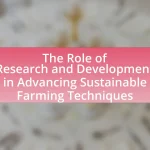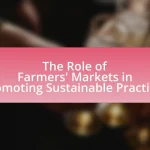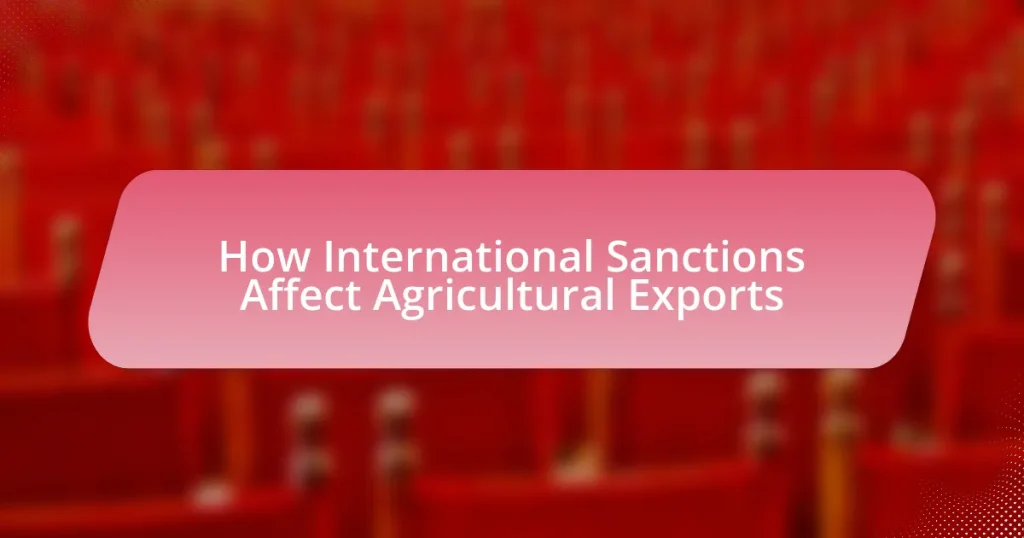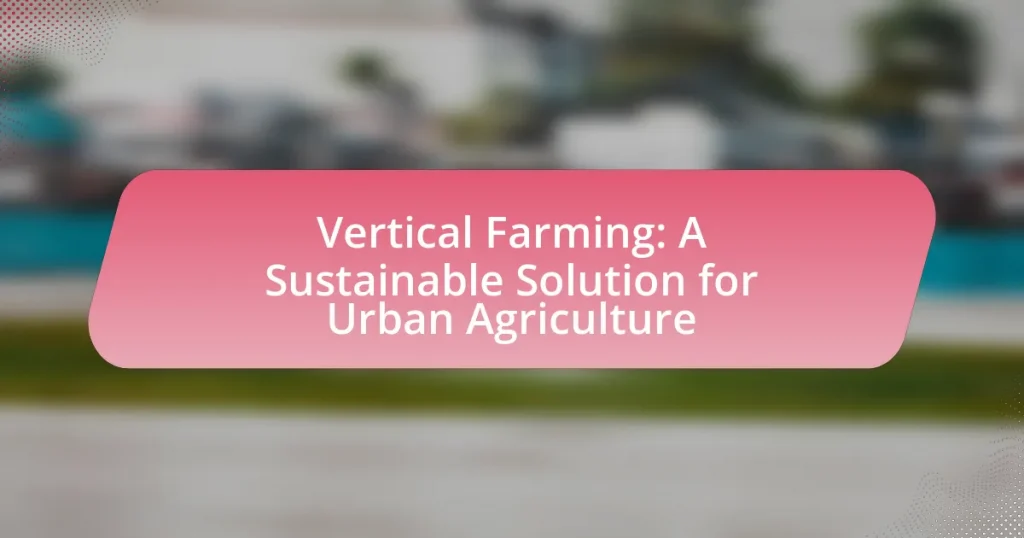International sanctions are restrictive measures imposed by countries or organizations to influence the behavior of targeted nations, significantly impacting agricultural exports. These sanctions reduce access to international markets and financial systems, leading to decreased demand and disrupted supply chains for agricultural products. The article examines the direct and indirect effects of sanctions on agricultural exports, including financial implications, market access restrictions, and the long-term consequences for agricultural innovation and development. It also explores how countries adapt their agricultural policies and strategies to mitigate the effects of sanctions, highlighting best practices for exporters navigating these challenges.
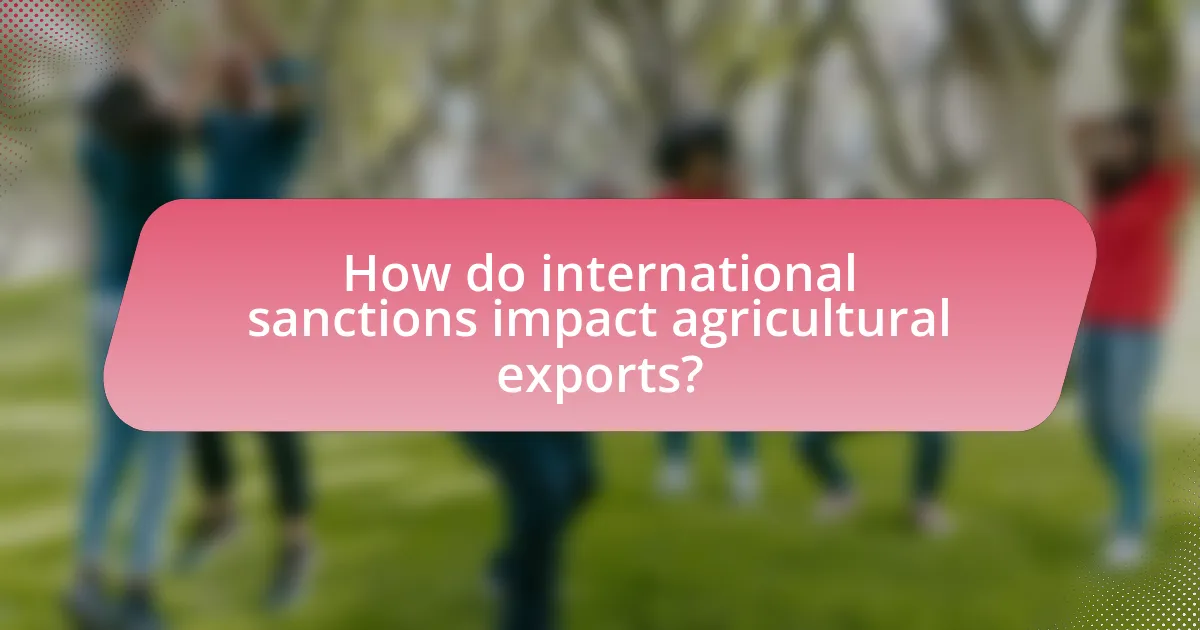
How do international sanctions impact agricultural exports?
International sanctions significantly reduce agricultural exports by restricting trade and financial transactions with targeted countries. These sanctions often lead to decreased access to international markets, as importing countries may avoid purchasing goods from nations under sanctions due to legal and reputational risks. For instance, the sanctions imposed on Iran have led to a dramatic decline in its agricultural exports, with reports indicating a drop of over 50% in certain sectors since the sanctions were enacted. Additionally, sanctions can disrupt supply chains and limit farmers’ access to necessary inputs, such as seeds and fertilizers, further diminishing agricultural productivity and export capacity.
What are international sanctions and their purpose?
International sanctions are restrictive measures imposed by countries or international organizations to influence the behavior of a target nation, entity, or individual. Their primary purpose is to compel compliance with international laws or norms, deter undesirable actions, or punish violations, such as human rights abuses or aggression. For instance, the United Nations has implemented sanctions against North Korea to curb its nuclear weapons program, demonstrating how sanctions can serve as a tool for international diplomacy and security.
How are agricultural exports defined in the context of international trade?
Agricultural exports in the context of international trade are defined as the sale and shipment of agricultural products from one country to another. These products include crops, livestock, and processed food items, which are traded to meet global demand and contribute to the exporting country’s economy. According to the Food and Agriculture Organization (FAO), agricultural exports play a crucial role in international trade, accounting for a significant portion of total trade value, with global agricultural exports reaching approximately $1.5 trillion in 2020. This definition highlights the importance of agricultural exports in facilitating trade relationships and economic growth across nations.
What types of international sanctions exist?
International sanctions primarily fall into two categories: economic sanctions and diplomatic sanctions. Economic sanctions include trade restrictions, asset freezes, and financial prohibitions aimed at limiting a country’s economic capabilities. For example, the United Nations imposed economic sanctions on Iraq in the 1990s to compel compliance with international law. Diplomatic sanctions involve the reduction or severance of diplomatic ties, such as expelling diplomats or suspending diplomatic relations, which can isolate a nation politically. An instance of diplomatic sanctions occurred when several countries expelled Russian diplomats in response to the poisoning of a former spy in 2018. These types of sanctions are designed to influence a nation’s behavior without resorting to military action.
What are the direct effects of international sanctions on agricultural exports?
International sanctions directly reduce agricultural exports by restricting access to foreign markets and financial systems. These sanctions often lead to decreased demand for agricultural products from the sanctioned country, as importers seek to avoid legal repercussions and reputational damage. For instance, the sanctions imposed on Iran have significantly diminished its agricultural exports, with reports indicating a drop of over 30% in certain sectors due to trade barriers and financial restrictions. Additionally, sanctions can disrupt supply chains, limit the availability of necessary inputs like seeds and fertilizers, and hinder the ability of farmers to secure financing, further exacerbating the decline in agricultural export volumes.
How do sanctions restrict access to markets for agricultural products?
Sanctions restrict access to markets for agricultural products by prohibiting trade with specific countries, thereby limiting their ability to export or import goods. These restrictions often include bans on financial transactions, which hinder the ability of agricultural producers to sell their products internationally. For instance, the U.S. sanctions against Iran have significantly reduced its agricultural exports, as financial institutions are reluctant to engage in transactions involving sanctioned entities. Additionally, sanctions can lead to increased shipping costs and insurance premiums, further deterring market access for agricultural products.
What financial implications do sanctions have on agricultural exporters?
Sanctions impose significant financial implications on agricultural exporters by restricting their access to international markets and financial systems. These restrictions can lead to decreased sales, as exporters may face barriers in shipping products, securing payment, and obtaining necessary financing. For instance, the U.S. sanctions on Iran have resulted in a sharp decline in its agricultural exports, with reports indicating a drop of over 50% in certain sectors due to limited market access and banking restrictions. Consequently, agricultural exporters may experience reduced revenue, increased operational costs, and potential insolvency, as they struggle to navigate the complexities introduced by sanctions.
What are the indirect effects of international sanctions on agricultural exports?
International sanctions can lead to significant indirect effects on agricultural exports by disrupting supply chains and increasing production costs. These sanctions often limit access to essential inputs such as fertilizers, seeds, and machinery, which are crucial for agricultural productivity. For instance, the sanctions imposed on Iran have resulted in a decline in its agricultural output due to restricted access to modern farming technologies and financial resources. Additionally, sanctions can lead to reduced foreign investment in the agricultural sector, further hampering growth and export potential. The overall impact is a decrease in the competitiveness of agricultural products in the global market, as seen in countries like Venezuela, where sanctions have contributed to a sharp decline in agricultural exports.
How do sanctions affect supply chains in the agricultural sector?
Sanctions disrupt supply chains in the agricultural sector by restricting access to essential resources, markets, and financial systems. For instance, when a country faces sanctions, its agricultural producers may struggle to obtain necessary inputs like seeds, fertilizers, and machinery due to trade restrictions. Additionally, sanctions can limit the ability to export agricultural products, as buyers in sanctioned countries may be deterred by legal and financial risks associated with engaging in trade. Historical examples include the impact of U.S. sanctions on Iran, which led to significant declines in agricultural exports and domestic food production, illustrating how sanctions can create bottlenecks and inefficiencies in supply chains.
What role does consumer perception play in the impact of sanctions on agricultural exports?
Consumer perception significantly influences the impact of sanctions on agricultural exports by shaping demand and market dynamics. When consumers perceive a country as being sanctioned, they may avoid purchasing its agricultural products due to ethical concerns or fear of quality issues, leading to decreased demand. For instance, research indicates that sanctions can lead to a 30% drop in exports from targeted countries, as consumers often associate sanctions with negative connotations regarding safety and reliability. This perception can further exacerbate the economic effects of sanctions, as reduced demand directly impacts the agricultural sector’s revenue and sustainability.
How do different countries respond to international sanctions regarding agricultural exports?
Different countries respond to international sanctions regarding agricultural exports by implementing various strategies to mitigate the impact on their economies. For instance, countries like Russia have sought to develop domestic agricultural production and diversify their export markets to reduce reliance on sanctioned goods. In contrast, nations such as Iran have engaged in barter trade and established alternative payment systems to circumvent financial restrictions. Additionally, some countries may resort to legal challenges against sanctions in international courts, arguing that such measures violate trade agreements. These responses are often influenced by the specific nature of the sanctions, the country’s economic structure, and its geopolitical alliances.
What strategies do countries employ to mitigate the effects of sanctions?
Countries employ various strategies to mitigate the effects of sanctions, including diversifying trade partnerships, enhancing domestic production, and utilizing alternative financial systems. For instance, nations like Iran have sought to establish trade relations with non-Western countries to bypass restrictions, while Russia has increased agricultural output to reduce dependency on imports affected by sanctions. Additionally, countries may adopt cryptocurrencies or barter systems to facilitate trade without relying on traditional banking systems, as seen in Venezuela’s efforts to engage in cryptocurrency transactions to circumvent financial sanctions. These strategies demonstrate a proactive approach to sustaining economic stability despite external pressures.
How do countries adapt their agricultural policies in response to sanctions?
Countries adapt their agricultural policies in response to sanctions by implementing measures such as diversifying crop production, increasing domestic food production, and seeking alternative markets. For instance, nations facing sanctions often shift focus from export-oriented crops to staples that ensure food security, as seen in countries like Iran, which increased wheat production after facing sanctions. Additionally, they may invest in agricultural technology and infrastructure to enhance self-sufficiency, as evidenced by Russia’s efforts to boost its agricultural sector following Western sanctions in 2014. These adaptations are crucial for maintaining food supply and economic stability under restrictive conditions.
What are the long-term consequences of international sanctions on agricultural exports?
International sanctions on agricultural exports lead to significant long-term economic and social consequences for the targeted countries. These sanctions often result in reduced agricultural production due to limited access to essential inputs like seeds, fertilizers, and technology, which can decrease crop yields over time. For instance, the sanctions imposed on Iran have led to a decline in its agricultural sector, with reports indicating a drop in wheat production by approximately 30% between 2012 and 2016.
Additionally, the loss of export markets can lead to decreased foreign investment in agriculture, further stunting growth and innovation in the sector. Countries like Venezuela have experienced a collapse in agricultural exports, which has contributed to food insecurity and malnutrition among the population. The long-term effects also include a shift in agricultural practices, as farmers may resort to subsistence farming due to the unavailability of international markets, ultimately affecting the overall economy and livelihoods.
How do sanctions influence agricultural innovation and development?
Sanctions negatively influence agricultural innovation and development by restricting access to essential resources, technology, and markets. For instance, countries facing sanctions often experience reduced foreign investment and limited access to advanced agricultural technologies, which stifles innovation. A study by the Food and Agriculture Organization (FAO) highlights that sanctions can lead to decreased agricultural productivity, as farmers lack the necessary tools and inputs to improve their practices. Additionally, sanctions can disrupt supply chains, making it difficult for agricultural producers to obtain seeds, fertilizers, and machinery, further hindering development in the sector.
What are the potential shifts in global agricultural trade patterns due to sanctions?
Sanctions can lead to significant shifts in global agricultural trade patterns by disrupting traditional supply chains and altering trade flows. For instance, when countries impose sanctions on major agricultural producers, such as Russia or Ukraine, it can result in reduced exports from those nations, leading to increased prices and shortages in global markets. Historical data from the 2014 sanctions against Russia showed a marked decrease in wheat exports, prompting countries like the European Union and the United States to seek alternative suppliers, thereby reshaping trade dynamics. Additionally, countries that are not subject to sanctions may increase their agricultural exports to fill the gaps left by sanctioned nations, further altering the landscape of global agricultural trade.
What are the best practices for agricultural exporters facing international sanctions?
Agricultural exporters facing international sanctions should prioritize compliance with legal regulations and seek alternative markets. Compliance ensures that exporters avoid legal repercussions and maintain their business integrity. For instance, understanding the specific sanctions imposed by relevant authorities, such as the U.S. Office of Foreign Assets Control (OFAC), is crucial for navigating trade restrictions. Additionally, exploring new markets in countries not affected by sanctions can help mitigate losses; for example, exporters can target regions in Asia or Africa that have growing demand for agricultural products. Establishing partnerships with local distributors in these markets can also facilitate smoother entry and distribution. Furthermore, diversifying product offerings can reduce dependency on specific markets, thereby enhancing resilience against sanctions.
How can exporters diversify their markets to reduce reliance on sanctioned countries?
Exporters can diversify their markets by identifying and targeting new geographical regions and sectors that are not affected by sanctions. This approach involves conducting market research to understand demand trends in emerging markets, such as Southeast Asia or Africa, where agricultural products may be in high demand. For instance, according to the Food and Agriculture Organization, the demand for agricultural imports in sub-Saharan Africa is projected to increase significantly, providing opportunities for exporters to enter these markets. Additionally, exporters can establish partnerships with local distributors or agents in these regions to facilitate market entry and navigate regulatory environments. By expanding their customer base beyond sanctioned countries, exporters can mitigate risks associated with geopolitical tensions and ensure more stable revenue streams.
What resources are available for exporters to navigate the challenges posed by sanctions?
Exporters can utilize various resources to navigate the challenges posed by sanctions, including government trade agencies, legal advisory services, and industry associations. Government trade agencies, such as the U.S. Department of Commerce and the Export-Import Bank, provide guidance on compliance with sanctions and offer support for affected exporters. Legal advisory services specialize in sanctions law and can help exporters understand the implications of specific sanctions on their operations. Additionally, industry associations often provide resources, including best practices and networking opportunities, to help exporters adapt to changing regulatory environments. These resources collectively assist exporters in mitigating risks and ensuring compliance with international sanctions.

